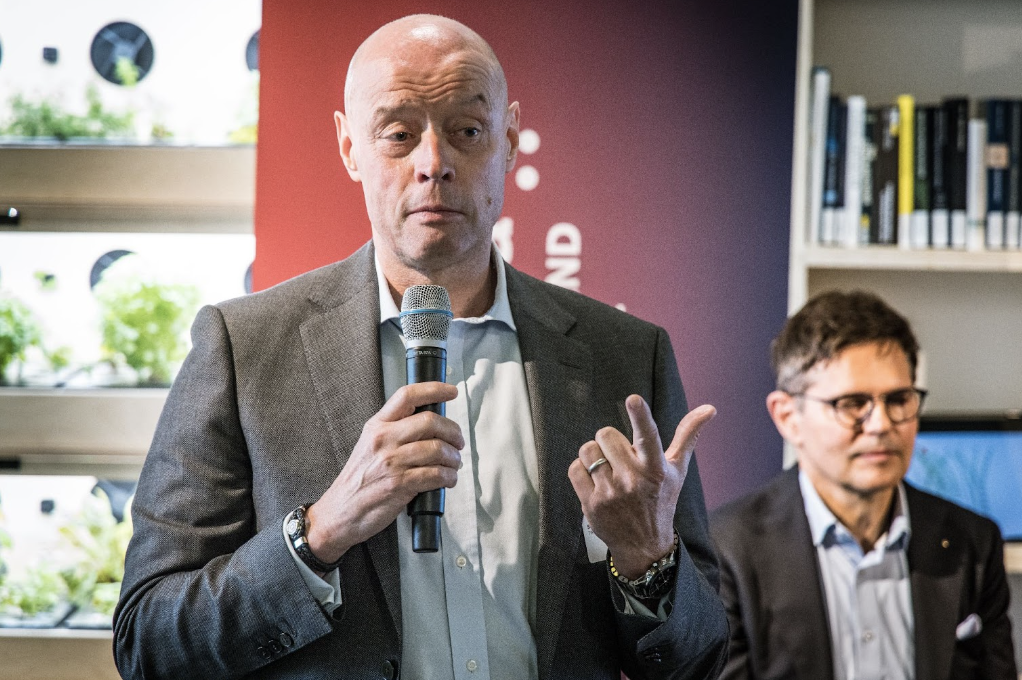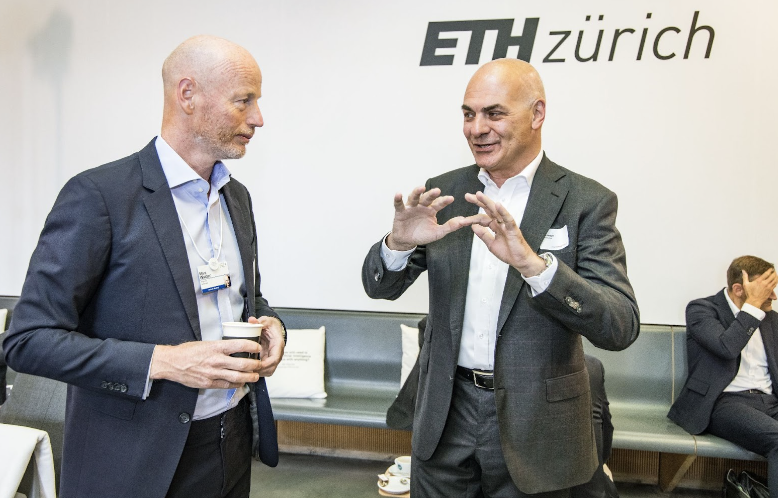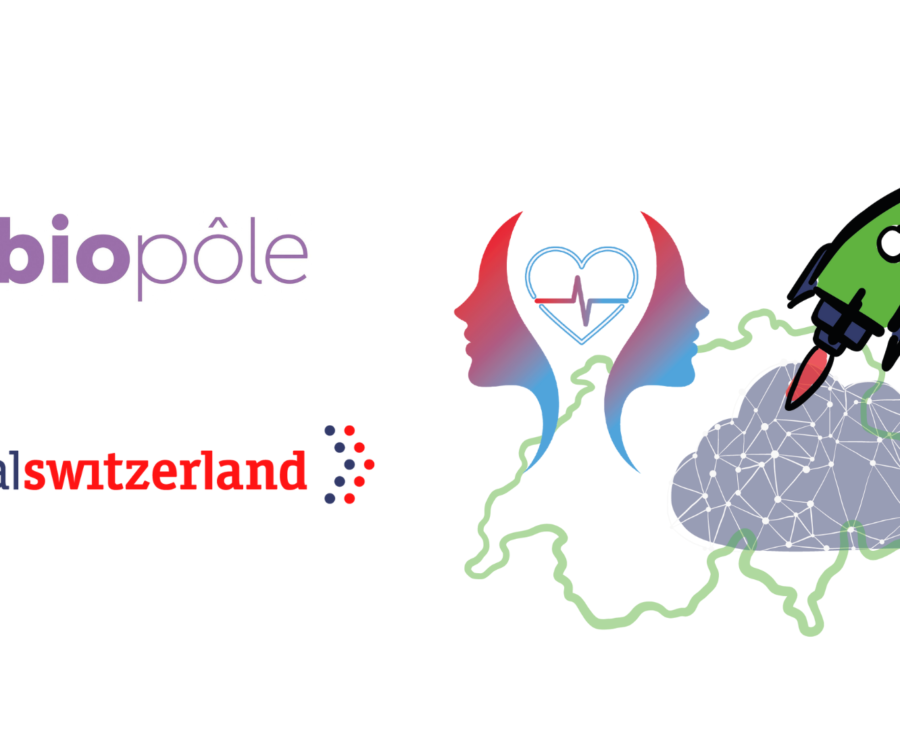One of Switzerland’s most important current challenges is how to digitalise its healthcare system. It is essential for Switzerland to find a common strategy and vision for it. It has been proven that this can only be solved through a joint collaboration of all ecosystem players. Switzerland must also address how to position the patient at the centre of the ecosystem, enabling them to have an optimised and efficient journey.
In the early lights of Tuesday morning, inspiring stakeholders exchanged around this topic at digitalswitzerland’s WEF Breakfast event, held on 24 May during the WEF 2022. Renowned experts arrived at 7am at the ETH Pavilion in Davos to discuss the different challenges and opportunities that Switzerland is currently facing to digitalise its healthcare system.

The event was launched with opening speeches from our two hosts, Prof. Dr. Joël Mesot, President of ETH Zurich and Marc Walder, founder of digitalswitzerland. “eHealth is one of the core topics of digitalswitzerland and of every country. Imagine that my mother goes to the doctor and the doctor pushes a button and he knows the health story of my mother: how wonderful would that be and how far are we in our country,” remarked Marc Walder, CEO and founder digitalswitzerland.


Anne Lévy opened her speech by outlining the government 2030 Health Strategy which priorises digitalisation. “We are actually promoting digitalisation and the use of data in order to reinforce the public’s ability to take informed decisions about their health, improve quality, increase efficiency and improve research through data. Experts all agree, digitalisation gives a multitude of benefits for patients and the health system in general. This can include better health outcomes, better quality of treatment and increase patient involvement in the treatment processes.”

Anne Lévy wanted the audience to reflect on the lessons learned from COVID-19 and how FOPH already improved in terms of digitalisation during the pandemic. The government is currently working on three projects to reduce the digitalisation backlog in the healthcare sector:
- Implement measures to improve data management by launching interdisciplinary projects
- Shaping the future of Electronic patient record (EPR) to collect the data only once and make easily accessible to all stakeholders
- Digitalise their own internal processes
She stated that the healthcare system will face high investment costs in the coming year to implement new technologies, leading to more patient empowerment. There are three distinct categories of technologies to mention:
- Solutions directly including the patient in healthcare management to overcome hurdles and maintain data privacy
- Solutions aimed at professionals and targeting efficiency
- Solutions and systems to support all stakeholders and the entire healthcare ecosystem, such as Electronic patient record
Anne Lévy concluded with a strong statement: “We want to create regulatory frameworks that encourage and support innovation. We are very aware that the pace of this development and innovation is extremely high. We need hospitals, doctors, pharmacies, insurers, the pharma industry, researchers, medtech companies and other players in the healthcare sector to work together to establish a useful ecosystem that we can benefit from. And I would be delighted if digitalswitzerland is willing to work with us to reach this goal”.

“eHealth” top-notch panel, moderated by digitalswitzerland’s Managing Director Stefan Metzger, was an insightful exchange between an insurance leader, a pharmaceutical leader and a medical tech-savvy doctor:
- Philomena Colatrella, CEO of CSS
- Christoph Franz, Chairman of the Board of F. Hoffmann-La Roche AG
- Dr. med. Conrad E. Müller, President of the Foundation Pro UKBB (University Children’s Hospital Basel) and former Director Clinic Hirslanden Zurich
Philomena Colatrella, CEO of CSS stated, “Trust is the main issue when we talk about digitalisation strategy in the healthcare system because the data is very sensitive. We have to explain WHY and make sure the BENEFITS are given and make this through transparency.” CSS has launched an initiative to start a dialogue with their insurers to make sure they understand how their data is being handled within the insurance. CSS also build up small ecosystems to connect the different stakeholders, such as MyCSS platform to interconnect insurers with the stakeholders and Well, a joint initiative from CSS, medi24, Visiana, Zur Rose Group and Alliance Care, which create an ecosystem that can become scalable at a federal level.
Digitalisation is already present in Switzerland. Doctors have multiple applications but rarely know which ones are really useful.“We have a big gap in education in the hospitals and for the doctors,” said Conrad Müller, President of UKBB. Apart from ETH medical school, there is no education in AI and digitalisation. The big problem identified by our tech- savvy doctor is that there is a lot of data but no place to connect the data together. “We have to educate the systems and not the products.”
In the Digital Pill, co-authored by Christoph Franz, it was stated that “digital literacy is now a prerequisite of health literacy”. Digitalisation happens inside each industry but Switzerland lacks the tools to exchange these data within the overall system. His book shows how the healthcare system could look like if we were already using these tools. “We could connect the dots and make electronic health records become a reality and not only a plan which will be implemented next year and this since ten years. In that sense, it’s something that should open the willingness of the public to want to make this a reality.”

Artificial intelligence is important to set up a robust system which will help the patient be aware of what diagnosis is to follow, what treatment to prioritise and who has the decision power over the shared medical information. As mentioned by Conrad Müller, “We have to build up an Electronic Patient Record, which is empowering the patient and it must be built from the bottom up.”
According to Christoph Franz, in order to have large data sets of health data for research, we need to hurry. “The first step is that we put them on a PDF and one day, we might even have a standardised format to use these data for example for research in an anonymised way.” It is very important that this data can be easily exchanged in the ecosystem and be stored in the next version of the electronic patient record.
Philomena Colatrella outlined three key ongoing reforms which will support digitalisation:
- Outpatient tariffs structure, Tarmed are being updated to make digital therapies accessible
- Digitalisation of alternative insurance models where data exchange is enhanced
- Uniformisation of outpatient and inpatient therapies financing
All panelists gave perspectives on the Electronic Patient Record and agreed that there is room for improvement:
- In Philomena Colatrella’s opinion the EPR should be used as the nucleus of a data trust centre architecture. This architecture would be made up of different health regions with different providers where data can be exchanged. The government would need to implement a legal framework for this.
- Anne Lévy believes that the EPR is highly needed for Switzerland, as for all the other countries which already have one in place. Standardisation needs to be implemented. She stated that EPR should be mandatory for everyone: for patients, doctors, pharmacies etc. and that the solution should come from the government to augment trust. A big issue comes from the law which was put in place 15 years ago. She mentions that, “we have to make laws that are agile, which are flexible enough to adapt to innovation which is not the case for the moment.”
- Christoph Franz believes that in order to speed up the process, we need to define minimum standards which need to be followed for the implementation of a digital solution.
- For Conrad Müller, it is critical that the law and the Electronic Patient Record are coordinated in order to run the system smoothly.
Denmark is a very digitally-advanced nation in terms of digitalisation of its healthcare system. The big difference between Switzerland and Denmark lies in the population’s attitude towards data usage. Switzerland needs to become more digitally literate. This would induce a population mindset-change and a more positive attitude towards data usage.
A participant from the audience, Soren Mose (Chairman of Twint) also shared his perspective on the difference between both countries as he holds both nationalities. Switzerland should take inspiration from Denmark’s e-ID and digital healthcare system, which would bring more trust and help the country move forward. Swiss citizens also need to realise that the highest threat to data is paper and not digitalisation.

“Currently, we don’t have a health care system, we have a “sick care system” and we need to make sure that the incentives are designed to specifically help people live healthier for longer,” mentioned the Chairman of Roche. Prevention will play a key role in the Swiss population which is continuously becoming older. By 2050 more than 1.1 billion people will be over 80 and have multiple comorbidities mentioned Conrad Müller. We need to take action and digitalisation can help.

At the end of the panel, Stefan Metzger, the Managing director of digitalswitzerland echoed this momentum. He quoted a Swiss Author, Friedrich Dürrenmatt “An individual approach to collective problems will fail”. We have seen this today, we need to all work together to change the ‘illcare system’ to a healthcare system. This is what digitalswitzerland stands for. We will not initiate one single new initiative. Our aim is to bring all the existing initiatives together to foster collaboration and orchestrate it.”

To find out more about our work in eHealth, contact our topic lead Jade Sternberg.






